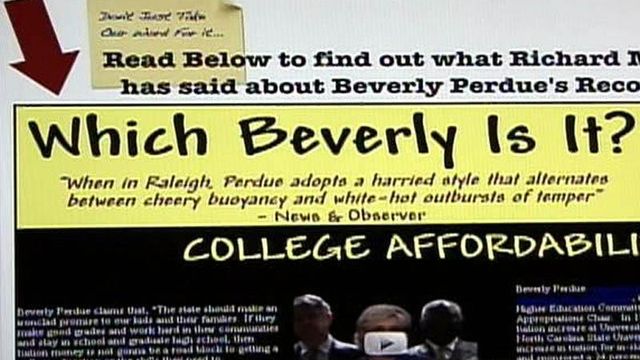Interest groups drive campaign message with attack ads
Shadowy special-interest groups sometimes spend as much money on negative political advertisements as the campaigns of major candidates spend.
Posted — UpdatedLoopholes in campaign-finance laws open the door to big money and limited disclosure for the so-called 527 groups. The name derives from the section of the federal tax code under which they operate.
A group called Alliance for North Carolina, for example, began airing television ads in July targeting Republican gubernatorial candidate Pat McCrory. The group was funded by the Democratic Governors Association and a political-action committee for a national teachers union.
More recently, the Republican Governors Association used a Web site that State Treasurer Richard Moore set up during his primary campaign for governor to bash the eventual Democratic nominee, Lt. Gov. Beverly Perdue.
"Even though the public says that they hate them, negative ads still move voters," said Joe Sinsheimer, a former Democratic consultant.
Voters need to be concerned about who's paying for the ads, Sinsheimer said.
Unlike tightly regulated campaign organizations, 527 groups can attract large amounts of money from special interests whose backers might be hard to identify. The groups are supposed to focus on issue advertising, but they can frame their ads to support or oppose a particular candidate.
"They can put up to $1 million on the air supporting a candidate or opposing another candidate, and that gives them large influence," Sinsheimer said.
Former state Rep. Rick Eddins blames a 527 for his loss two years ago in his re-election campaign. Mailers sent by a special-interest group incorrectly tied him to corruption, he said.
"I see it doing nothing but getting worse and worse," Eddins said of unregulated shadow tactics. "Let's get these special interests out of our elections, just like we want to get (them) out of Wall Street."
Leaders of 527 groups maintain they operate within campaign-finance laws and that any effort to stop their influence is an attack on political free speech.
In a split vote last week, the State Board of Elections backed off a 527 funding controversy, calling on lawmakers and the courts to clarify the rules.
"The bottom line is to have full disclosure so the public can make up their own minds," said Gary Bartlett, executive director of the State Board of Elections. "When it comes to 527s, is there that disclosure now? Disclosure is delayed, and it's very hard to come by."
• Credits
Copyright 2024 by Capitol Broadcasting Company. All rights reserved. This material may not be published, broadcast, rewritten or redistributed.






